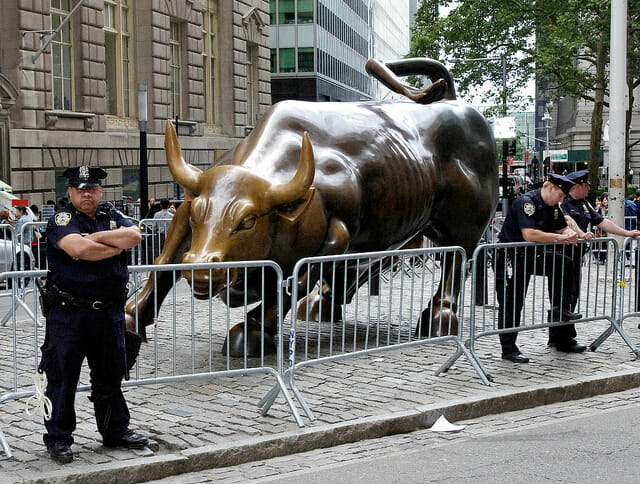Capitalism Is Beyond Saving, and America Is Living Proof
In one of the most prosperous societies ever to exist on earth, nearly half the population struggles to make ends meet. David Shankbone / Flickr
David Shankbone / Flickr
Policies that fail in the same way over and over are not failing. Someone is lying about their intent. The drug war didn’t fail to stem the flow of banned narcotics and to stop epidemic abuse and addiction; it succeeded at building a vast carceral and surveillance apparatus targeted at people of color as a successor to Jim Crow.
The war in Iraq didn’t fail to bring democracy to the Middle East; it smashed an intransigent sometimes-ally in the region, and deliberately weakened and destabilized a group of countries whose control of, and access to, immense oil reserves was of strategic American interest.
The “end of welfare as we know it” didn’t fail to instill in the nation’s poor a middle-class sense of responsibility; it entrenched a draconian regime of means-testing and a Kafkaesque bureaucracy for access to even meager social benefits for a rapidly shrinking middle class.
It’s not that “Capitalism isn’t working,” as Noah Smith recently argued in Bloomberg. It’s that it’s working all too well.
Real wage growth has been nonexistent in the United States for more than 30 years. But as America enters the 10th year of the recovery—and the longest bull market in modern history—there are nervous murmurs, even among capitalism’s most reliable defenders, that some of its most basic mechanisms might be broken. The gains of the recovery have accrued absurdly, extravagantly to a tiny sliver of the world’s superrich. A small portion of that has trickled down to the professional classes—the lawyers and money managers, art buyers and decorators, consultants and “starchitects”—who work for them. For the declining middle and the growing bottom: nothing.
This is not how the economists told us it was supposed to work. Productivity is at record highs; profits are good; the unemployment rate is nearing a meager 4 percent. There are widely reported labor shortages in key industries. Recent tax cuts infused even more cash into corporate coffers. Individually and collectively, these factors are supposed to exert upward pressure on wages. It should be a workers’ market.
But wages remain flat, and companies have used their latest bounty for stock buybacks, a transparent form of market manipulation that was illegal until the Reagan-era SEC began to chip away at the edifice of New Deal market reforms. The power of labor continues to wane; the Supreme Court’s Janus v. AFSCME decision, while ostensibly limited to public sector unions, signaled in certain terms the willingness of the court’s conservative majority—five guys who have never held a real job—to effectively overturn the entire National Labor Relations Act if given the opportunity. The justices, who imagine working at Wendy’s is like getting hired as an associate at Hogan & Hartson after a couple of federal clerkships, reason that every employee can simply negotiate for the best possible deal with every employer.
To those for whom capitalism cannot fail but can only be failed, the answers lie at the margins. Neoliberal doctrine forecloses any hope of large-scale change; present circumstances always prevent future possibilities. Instead, as Smith writes, “there are some simpler, humbler changes that state governments can begin taking right away, without waiting for labor-friendly politicians to take control of the White House and Congress.”
These changes involve banning noncompete agreements, through which companies forbid employees from going to work for competitors, and more assiduously policing industry wage-fixing.
Both would be fine reforms, but neither would have much effect on the labor share of gross domestic product. They are minor symptoms of the capitalist disease. Capitalism isn’t broken; it’s working precisely as it’s supposed to: generating surpluses and giving all of them to a small ownership class. The New Deal and postwar prosperity, which barely lasted until 1980, represent historic outliers—the one significant period in which growth at the top was somewhat constrained and a relatively large share of wealth went to the middle. It was possible only through massive government intervention and redistribution, combined with a powerful labor sector backed by that same federal government. It took the collective power of entire societies to briefly restrain capitalism, which, left to its own devices, will do what it has always done: make the already very rich infinitely richer. Capitalism is “working” just fine.
What we are seeing, I suspect, is an acceleration of a broader social transformation that’s been occurring for some time. Rome, the saying goes, wasn’t built in a day, but neither did it fall in one, either. Changes to societies as large and complex as theirs or ours occur subtly and over years—if not decades. Those workers who do remain in the workforce increasingly depend on work and work alone for all their benefits. The companies for which most people work are like the Roman villas that gradually became central nodes of a manorial society as the imperial metropole retreated through a series of self-inflicted wars and crises of governance.
One moment you’re working for some kind of money wage in a fully monetized economy; the next you’re living in a company town, buying your groceries with scrip, and you can’t leave without your boss’ permission.
In America today, supposedly the most prosperous society ever to exist on earth, nearly a third of families report experiencing economic hardship. Sixty percent—60 percent!—say they could not cover an unexpected expense of $1,000, and nearly 40 percent have less than $500 in savings. People with good insurance get billed $100,000 for having a heart attack. People commute four hours a day because they can’t afford to live in the cities where they work.
The barbarians aren’t at the gates. They’re already here in the boardrooms; they’ve been here all along.
Your support is crucial…With an uncertain future and a new administration casting doubt on press freedoms, the danger is clear: The truth is at risk.
Now is the time to give. Your tax-deductible support allows us to dig deeper, delivering fearless investigative reporting and analysis that exposes what’s really happening — without compromise.
Stand with our courageous journalists. Donate today to protect a free press, uphold democracy and unearth untold stories.









You need to be a supporter to comment.
There are currently no responses to this article.
Be the first to respond.